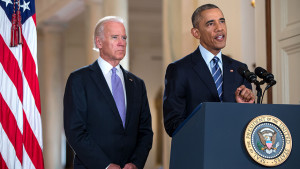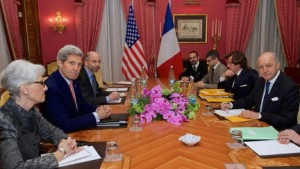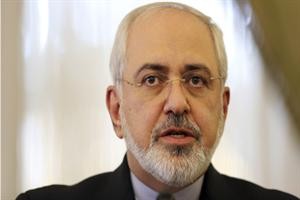Exclusive: With the Iran nuclear agreement, President Obama opened lines of communications to Iran, but political pressures in Washington prevent a more substantive shift in relations, reports Gareth Porter.
By Gareth Porter
A former Obama administration official has asserted that the Iranian nuclear deal marks a radical break with past U.S. policy, contradicting the official White House stance that the agreement is not leading to a new U.S.-Iran relationship.
John Limbert, a Farsi-speaking veteran diplomat who was among the hostages from the U.S. Embassy in Tehran in 1979 and later Professor of Middle Eastern studies at the U.S. Naval Academy, served as Deputy Assistant Secretary of State for Iran policy during Obama’s first term.

President Barack Obama, with Vice President Joe Biden, announcing the signing of the Iran-nuclear agreement on July 14, 2015. (White House photo)
Limbert writes, “Although officials will never admit it, there has been a drastic change in relations, and we are seeing interactions that a few [years] ago were unthinkable.” Limbert recalls that the United States rarely spoke to an Iranian official for 34 years, and that minor incidents between the two states were blown out of proportion, sometimes into crises.
Now, he observes, Secretary of State John Kerry and Iranian Foreign Minister Mohammad Javad Zarif are “in constant communication” and “are meeting regularly” on issues that go beyond the Joint Comprehensive Plan of Action (JCPOA). Furthermore, the Obama administration has described those contacts as “positive and productive,” he writes.
Limbert argues that the attempts by both Washington and Tehran to portray JCPOA as “only a one-off event [that] has no larger implications for U.S.-Iranian relations” are misleading.
“As both governments continue to issue statements that the nuclear agreement has changed nothing and the two sides remain sworn enemies,” he writes, “it is clear that much has changed.”
Limbert is correct in identifying the state of relations with Iran as a real shift in U.S. policy toward Iran. But the shift is not a “breakthrough” in ending the U.S. policy of treating Iran as an adversary, as he implies.
In fact, it is an adjustment of policy necessitated by the changing U.S.-Iran power relationship. That power relationship is still unequal, but it is now clear that it no longer allows Washington to demand any major policy change by Iran.
Coercion as Policy
For more than three decades, the presumption underlying U.S. policy was that the United States could force Iran to accept a U.S.-dominated regional order, either through regime change or by using coercive diplomacy to get Iran to change its policies to conform to U.S. interests.
The Reagan administration hoped the Iraqi invasion of Iran would lead to the overthrow of the Islamic Republic and tried to force Iran to give up its peaceful nuclear program. The Bill Clinton administration not only sought to isolate Iran from the capitalist world but also supported an Israeli effort to prevent Iran from acquiring a conventional missile capability as a minimum deterrent.

Secretary of State John Kerry meets with his diplomatic team and their French counterparts during negotiations with Iran over its nuclear program in Switzerland on March 28, 2015. (State Department photo)
President George W. Bush’s neoconservative core group planned to use U.S. military force to overthrow the Islamic Republic once U.S. troops had gained control over Iraq, and was angry when the Olmert government in Israel failed to use force to take down Iran’s only foreign ally, the Syrian regime of Bashar al-Assad, in 2006.
But those policies were based on the neocons’ absurdly exaggerated notions about their ability to use U.S. military power to carry out “regime change” in the Middle East.
The Obama administration came to power without such illusions, but President Obama nevertheless adopted an elaborate strategy of coercive diplomacy aimed at getting Iran to accept the U.S. demand for an end to uranium enrichment.
Obama quickly approved a joint U.S.-Israeli cyber-attack against the nuclear facility at Natanz, which was carried out in June 2009. After Iran rejected a U.S. proposal that it give up two-thirds of its stockpile of low-enriched uranium in exchange for nuclear fuel for a research reactor producing isotopes for cancer patients, Obama announced that his “engagement” with Iran was finished, and that it was time for “pressure” on Iran.
In its 2010 Nuclear Posture Review, the administration went so far as to suggest publicly that the United States would use nuclear weapons against Iran if Iran used conventional force “against the U.S. or its allies or partners.”
Obama explicitly linked the new policy to the administration’s broader campaign of coercive diplomacy on Iran, saying,“[W]e want to send a very strong message both through sanctions, through the articulation of the Nuclear Posture Review…, that the international community is serious about Iran facing consequences if it doesn’t change its behavior.”
Economic Sanctions
But economic sanctions were the primary substitute for a military threat that was recognized as no longer effective as an instrument for coercion of Iran. In 2011, the Obama administration sponsored a new system of economic sanctions aimed at depriving the regime of the ability to obtain hard currency from its oil exports. It also promoted the false threat of an Israel attack on Iran in Spring 2012.
As late as October 2012, during his reelection campaign, Obama was still publicly demanding that Iran abandon uranium enrichment. But Iran had not softened its stance in the face of the suite of diplomatic and economic pressures. Instead it had increased its stockpile of low-enriched uranium and began enriching uranium to 20 percent.
The Obama administration knew that Iran was using its enrichment program to enhance its bargain leverage with Washington, but Obama felt that he needed to resolve the issue before it led to overwhelming pressures for war against Iran.
So, Obama agreed to begin negotiations with Iran in 2013 on the explicit understanding that talks would result in a peaceful Iranian nuclear program that would be regarded as legitimate and end the regime of sanctions imposed to pressure Iran over the nuclear issue. It was the first significant step away from the application of coercive diplomacy on Iran by the U.S government.
U.S. Foot-dragging
The Obama administration tried to deny or delay the removal of U.S., European and UN sanctions right up to the end of the nuclear negotiations, but in the end it had to let go of that form of attempted coercion. New political-military developments in the region also made it increasingly obvious that the continued U.S. pursuit of coercive diplomacy toward Iran would be both futile and self-defeating.
Those other factors included the rise of Al Qaeda’s Nusra Front and Daesh (or the Islamic State), the direct military role of Iran and Hezbollah in fighting them in Iraq and Syria, and policy rifts between the White House and Saudi Arabia. Those developments make it incumbent on the United States to confer with Iran on the basis of respect for its interests.
Limbert is correct in observing that the Obama administration will never admit that it has made a significant shift in its Iran policy. But the reason is that the administration sees itself as upholding a policy of trying to contain Iranian power in the region rather than accommodating it.
In doing so, the administration still appears to be seeking whatever leverage on Iran it can find. The sanctions against Iran in U.S. law on the pretexts of terrorism and “money laundering” have created uncertainty on the part of European banks and businesses about investing in Iran.
Under the JCPOA, the United States is obligated to take specific actions to make it clear to banks and businesses that they need no longer fear U.S. sanctions against them if they resume business relations with Iran. But Iran has complained bitterly that the United States has not done that, and the administration needs Iranian help to get out of its policy jam in Syria.
More important in the administration’s continued treatment of Iran as an enemy are bureaucratic and domestic political interests in such a policy that have accumulated over more than three decades. The Treasury Department has acquired enormous influence over foreign policy in its role administering sanctions against Iran, and the operations of its Office of Terrorism and Financial Intelligence have long reflected the interests of the Israeli lobby.
The Defense Department, Central Intelligence Agency and National Security Agency also have powerful bureaucratic interests in continuing their close working relationships with Saudi Arabia.
For the NSA and CIA, Saudi Arabia has been a source of major off-the-books budgetary support – compensation for services rendered in the case of the NSA and funding for covert operations in the case of the CIA.
For the Pentagon, the Saudi military and other anti-Iran Sunni sheikhdoms have represented a massive market for high-tech military sales that assures steady profits for major military contractors and plentiful future jobs for generals and admirals.
Furthermore, the continued U.S. military access to bases in the Gulf depends on maintaining a security relationship with Saudi Arabia. The U.S. military role is justified in large part by the pretense that Iran – not Saudi Arabia – represents the main threat to stability and security in the region.
All those interests combine to ensure that this administration and its successor will continue to issue ritual denunciations of Iran’s “nefarious activities” in the region. Thus, the chasm between U.S. rhetoric on Iran and political reality can only widen in the years to come. But the harsh rhetoric will limit how far cooperation between Tehran and Washington can go.
Gareth Porter is an independent investigative journalist and winner of the 2012 Gellhorn Prize for journalism. He is the author of the newly published Manufactured Crisis: The Untold Story of the Iran Nuclear Scare.


This analysis suggests that NSA and CIA are substantially funded by foreign powers and serve those interests. Political pressure from KSA and Israel and the MIC at Treasury and the Pentagon also serve foreign powers. These agencies need to be purged of those who do not serve the people of the United States, pretending that they do that by serving foreign powers and economic powers. They should be investigated individually as traitors or abusers of office, and in those cases fired or jailed and declared permanent security risks.
Cooperation is one thing; policymaking is another branch.
HERE ! HERE! MR. PORTER
There seems little substantive comment to add.
The repercussions of the change in the presidency
in 2016 (actually 2017) is not considered, Perhaps it
cannot be based on the knowledge now available.
Personally, I am absolutely convinced that despite Hillary
Clinton’s brave statement that Israel has “made the desert bloom”
—and bleed—an H. Clinton victory would be a disaster
for Middle East policies which I favor. I am not at all convinced
that opponent Donald Trump would be much better. Trump could
in fact be even worse based on what is now known..(Little is that
reliable at this time.)
In either case, we shall have to look forward to some tough
battles to save the world from itself. We must also recognize
that will not win many.
Thanks again to Gareth Porter for his superb essay. If you
have not already read his MANUFACTURED CRISIS…
i urge you to waste no time in doing so.
—Peter Loeb, Boston, MA, USA
Since I can’t add anything to Mr. Porter’s analysis, I will simply say that I trust his reportage on the Iran/US relationship. Everybody’s afraid of Iran, except those who are being abused by the US and the NATO empire.